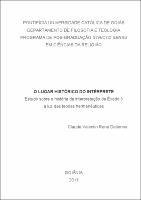| Compartilhamento |


|
Use este identificador para citar ou linkar para este item:
http://tede2.pucgoias.edu.br:8080/handle/tede/747| Tipo do documento: | Tese |
| Título: | O lugar histórico do intérprete: Estudo sobre a história da interpretação de Êxodo 3 à luz das teorias hermenêuticas. |
| Título(s) alternativo(s): | The historical locus of the interpreter: Study on the history of the interpretation of Exodus 3 in the light of hermeneutical theories. |
| Autor: | Detienne, Claude Valentin René  |
| Primeiro orientador: | Reimer, Haroldo |
| Primeiro membro da banca: | Quadros, Eduardo Gusmão de |
| Segundo membro da banca: | Silva, Valmor da |
| Terceiro membro da banca: | Ribeiro, Osvaldo Luiz |
| Quarto membro da banca: | Cavalcante, Ronaldo de Paula |
| Resumo: | Esta tese tem por objetivo estudar a articulação da tríade autor-texto-intérprete na história da exegese do capitulo 3 do livro do Êxodo, através dos conceitos de intentio auctoris, intentio operis e intentio lectoris evidenciados por Umberto Eco. O estudo dos comentários do Midrash Rabbah, de Cirilo de Alexandria, de Teodoreto de Cirro, de Brevard Springs Childs e de Jorge Pixley evidencia a grande dificuldade de distinguir as três intentiones, assim como a definição de critérios para distinguir entre interpretação correta e interpretação errada, tanto no plano teórico, quanto na prática hermenêutica dos exegetas. A tese busca confirmar que a ausência de limite claro entre as três intentiones se deve ao fato de que a intentio lectoris sempre acaba se sobrepondo às outras e vê na consciência desse fato um instrumento importante na luta contra o dogmatismo e a pretensão à exclusividade que sempre ameaçaram a exegese bíblica. |
| Abstract: | The present thesis aims to study the relationship of the triad text-author-interpreter in the history of the exegesis of the third chapter of the book of Exodus, through the concepts of intentio auctoris, intentio operis and intentio lectoris as evidenced by Umberto Eco. The study of the commentaries of Midrash Rabbah, Cyril of Alexandria, Theodoret of Cyrrhus, Brevard Springs Childs and Jorge Pixley shows the difficulty of distinguishing the three intentiones evidenced by Umberto Eco, and defining criteria to distinguish the correct and wrong interpretations, both on theoretical level and in the hermeneutical practice of the exegetes. The thesis seeks to confirm that the absence of clear boundary between the three intentiones is due to the fact that the intentio lectoris always ends up dominating the other ones and sees in the consciousness of this fact an important tool for fighting dogmatism and the exclusivity claims that have always threatened biblical exegesis. |
| Palavras-chave: | Bíblia Êxodo hermenêutica história da exegese Bible Exodus Hermeneutics History of Exegesis |
| Área(s) do CNPq: | CNPQ::CIENCIAS HUMANAS::TEOLOGIA |
| Idioma: | por |
| País: | BR |
| Instituição: | Pontifícia Universidade Católica de Goiás |
| Sigla da instituição: | PUC Goiás |
| Departamento: | Ciências Humanas |
| Programa: | Stricto Sensu - Doutorado em Ciências da Religião |
| Citação: | DETIENNE, Claude Valentin René. The historical locus of the interpreter: Study on the history of the interpretation of Exodus 3 in the light of hermeneutical theories.. 2011. 154 f. Tese (Doutorado em Ciências Humanas) - Pontifícia Universidade Católica de Goiás, GOIÂNIA, 2011. |
| Tipo de acesso: | Acesso Aberto |
| URI: | http://localhost:8080/tede/handle/tede/747 |
| Data de defesa: | 11-Out-2011 |
| Aparece nas coleções: | Doutorado em Ciências da Religião |
Arquivos associados a este item:
| Arquivo | Descrição | Tamanho | Formato | |
|---|---|---|---|---|
| Claude Valentin Rene Detienne.pdf | 4,41 MB | Adobe PDF |  Baixar/Abrir Pré-Visualizar |
Os itens no repositório estão protegidos por copyright, com todos os direitos reservados, salvo quando é indicado o contrário.




